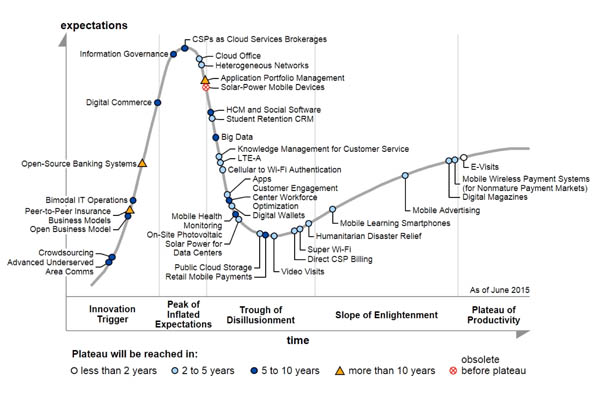The "Hype Cycle for ICT in Africa, 2015" report released by Gartner, Inc. identifies over 30 key technologies and describes how they will impact business performance during the next 10 years.
"The Hype Cycle (see Figure 1) aims to help global strategic officers and domestic CIOs from the private and public sectors take account of the current state of important technologies across Africa, including their maturity, adoption and traction," said Mbula Schoen, senior research analyst at Gartner. "It will help them make informed decisions about where to invest and how to advance their operations locally."
Figure 1. Hype Cycle for ICT in Africa, 2015
Source: Gartner (August 2015)
One solution does not fit all
Innovations in information and communication technology (ICT) are dramatically changing the way African governments and businesses operate. For example, sophisticated data mining is being used in smart agriculture in several countries to improve how crops are grown by predicting weather, demand and outbreaks of disease.
The biggest challenge remains the fact that one solution does not suit all countries in Africa. Companies trying to grow their business operations throughout the continent must understand the local market conditions within each country. Small deals stress the business models of many global vendors, to the advantage of local companies.
Africa to experience "growing pains" as communications mature
Africa is emerging in terms of the deployment and use of communications infrastructure. According to Gartner, spending on end-user communications services in sub-Saharan Africa will grow steadily in the next five years, and reach $71 million in 2019.
The largest group of enterprise solutions are likely to experience "growing pains" as the ecosystems mature and expectations exceed performance centres on payment. It includes digital wallets, retail mobile payments and direct communications service provider billing.
This is apparent, for example, from the aftermath of the hype surrounding the launch of the Apple Pay service last year. Global adoption of contactless transactions and NFC-enabled mobile payments has been slow, whereas SMS-based solutions have had better adoption in India and parts of Africa. Consumers' lack of enthusiasm for retail mobile payments (mainly due to security concerns) and the unwillingness of large, multi-channel retailers to invest in mobile payment processing infrastructures have put this technology almost in the Trough of Disillusionment. Mass global adoption is five to 10 years away.
Bimodal IT operations
Of the 35 technologies on the Hype Cycle, 13 will mature within the next five years and have a transformational or high impact on businesses. Of those, some will enable new ways of doing business across industries, such as bimodal IT operations.
An organisation with bimodal IT capability can aim to "do it right" for some projects, as was historically the IT department's mission, but simultaneously strive to "do it fast" for others, where governance is less of a concern and speed or agility is paramount. Over half the organisations in Africa already take a two-speed approach to IT projects, compared with the global average of 45 percent.

Mbula Schoen
The mobile telephony revolution
"The mobile telephony revolution that has transformed connectivity in Africa will continue to evolve, with further penetration in the next two years coming from ultra-low-cost mobile devices. The revolution is also drawing investors to mobile learning (m-learning), as this helps promote the evolution of mobile usage in Africa," said Schoen.
Through 2015, emerging smartphone apps (such as augmented-reality viewers, smartphone e-book readers and scriptable mapping tools) will offer new delivery platforms for educational content. However, platform differences will impact m-learning delivery technologies on smartphones for the remainder of the year. For example, technology-neutral content delivery tools, such as HTML5, may not have matured enough. Certain types of innovative apps may evolve more quickly on more open platforms, such as Android, which impose fewer technical and commercial restrictions on developers.
In addition, the continued proliferation of connectivity in semi-urban and rural parts of Africa could represent a powerful force to narrow the "digital divide," one of the biggest social issues in Africa. This goal will be addressed, in part, by Advanced Under Served Area Comms consisting of non-traditional communication systems like high-altitude balloons, airborne drones and very large constellations of small communications satellites, for regions under served by terrestrial or conventional communications satellites.
Further information is available in Cycle for ICT in Africa, 2015. Gartner analysts will also discuss digital business trends at Gartner Symposium/ITxpo 2015, which will take place September 28-30 in Cape Town, South Africa.
























































